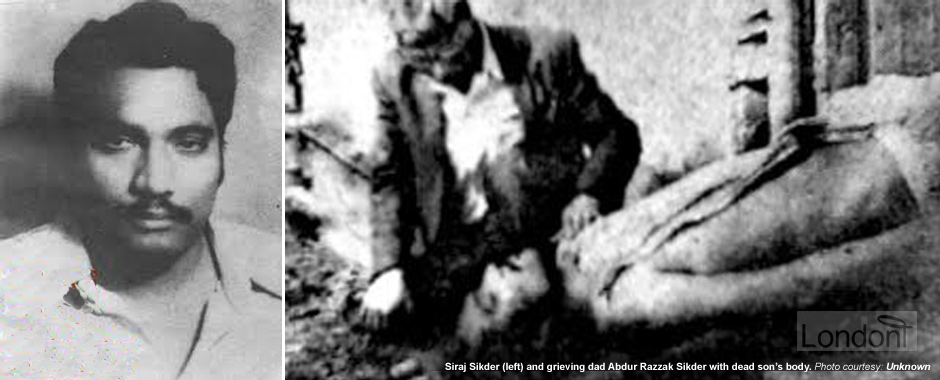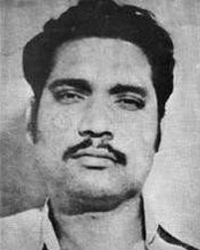
Controversial killing of Siraj Sikder
Siraj Sikder was a valiant freedom fighter during 1971 Muktijuddho who established the leftist 'Purba Bangla Sarbahara Party' (Proletarian Party of East Bengal) on 3 June 1971 as a minor guerrilla faction and political platform for the deprived or 'have-nots' (sarbahara) classes.
 Siraj Sikder ()
Siraj Sikder ()
At a liberated base area named Pearabagan in the southern part of the country, on 3 June 1971, Siraj Sikder founded a new party named 'Purba Banglar Sarbahara Party' by ideology of Marxism and Mao Tsetung Thought (not "Maoism", during the 1960s the followers of Mao-line used to identify their ideology as Marxism-Leninism-Mao Tse-tung Thought). At the beginning of the war he went to Barisal and he declared that as a free living space and making it his base attempted to initiate his revolution throughout other places. The war he fought was of different ideology than who fought in the name of the Mukti Bahini. He fought to eradicate the economic suppression by state machinery irrelevant of their nationality.
Siraj was elected President of the party at its first congress on 14 January 1972. The following year he was again elected President of an alliance of eleven people's organisation called 'Purba Banglar Jatiya Mukti Front' (National Liberation Front of East Bengal). The party reached its peak in 1974. After independence it reorganised its guerrilla bands and identified the Mujib government as its new enemy. Siraj launched armed struggle against the government in different parts of the country with an object of establishing the supremacy and rule of the sarbaharas. Sometimes his party members broke open government warehouses to distribute food to the hungry.
However, after the Government of Bangladesh announced the first ever state of emergency in the history of Bangladesh to arrest all the terrorists and opposition leaders on 28 December 1974, Siraj Sikder went underground. He was arrested by intelligence agents four days later in Halishahar, Chittagong, and flown to Dhaka. He was killed the next day, on 2 January 1975, by police firing on his way from Dhaka airport to the JRB camp at Savar. The official explanation given at that time was that Siraj Shikdar was shot dead "while trying to escape".
However, according to his brother-in-law, Zackaria Chowdhury ('Zack'), Siraj Shikdar was escorted to Dhaka and taken to Gonobhaban to meet Sheikh Mujib. The Sheikh tried to win him over, but when Siraj refused to compromise Sheikh Mujib ordered the police to 'deal' with him. He was then driven handcuffed and blindfolded to the police control room on the disused Dhaka racecourse and then taken out at night on a lonely road and shot.
I was arrested on 29 December 1974 and taken to the top floor of the building where Siraj Sikder was incarcerated. That night I heard Siraj's agonised groans when he was being tortured. I heard later that Siraj was killed without being produced before any court on 2 January 1975, during the regime of the Awami League government.
Barrister Moudud Ahmed, a BNP leader and former Awami League member
He [Siraj Sikder] was tortured all day long and a rumor was spread that he was killed by Jatiyo Rakkhi Bahini on his way to the camp at Savar on 2 January 1975. His hand was tied and it was impossible for him to even move. There were clear spots of bullets which indicated that he was shot from a short distance. So it cannot be called as a cross-fire though the government mentioned it as a cross-fire. But a Jatiyo Rakkhi Bahini commander later denied that the murder of Siraj Sikder was not committed by his force. The actual fact behind the incident is still unknown.
Zack's wife and Siraj's sister Shamim also holds the same view. She maintains that the bullet wounds on Siraj's body clearly showed he had been shot from the front six times in the chest, probably with a sten gun. Her conviction was so strong that she even attempted to take Sheikh Mujib's life as revenge for her brother's controversial death.
Whatever the reason, it was openly talked about in Dhaka that Siraj Sikder had been liquidated on Mujib's instructions. Shamim herself was convinced that her brother had died by Mujib's hand. So this 19-year old girl decided to take revenge. "I got a revolver from the (Sharbohara) party and looked for an opportunity to kill this murderer" she told me. Shamim was banking on the fact that, as she was one of Bangladesh's best known sculptresses who had won the President's award for achievement the year before, she could get close enough to Mujib and shoot him.
She made several requests for an appointment with Mujib. Each time she was put off. Then she invited him to an exhibition at the Dhaka University's school of art. Mujib accepted the invitation but failed to turn up. "I was getting desperate" she recalls. "However much I tried I just couldn't get within shooting distance of him". She never did. Fate intervened to save Mujib. Shamim fell in love, got married to Zack and left the country with her husband.
Anthony Mascarenhas on Siraj Sikder's sister, Shamim's, attempt to kill Sheikh Mujib
Three weeks after his death, on 25 January 1975, Sheikh Mujibur Rahman questioned the leadership of Siraj Sikder as part of his speech.
Kothai aj Siraj Sikder? (Where is Siraj Sikder today?)
Sheikh Mujibur Rahman in Jatiyo Sangsad (Parliament) after Siraj was murdered
Sheikh Mujib's statement was interpreted as boasting in parliament and arose strong suspicion in some members of the intelligentsia that Sheikh Mujib had ordered the death of Siraj Sikder. His infamous rhetoric was repeated by his detractors as further proof that 'power had gone to his head'.
Much against the aspiration of the people, the newly created country’s leader failed to rise above the mere party interest and rebuild the country as promised as a Golden Bangla. Many opposition activists were killed. Bangladesh history may alway have to carry the burden of the murder of Siraj Sikder, a prominent leftist leader.
Until today no government, including Awami League opposition parties, has done anything for the trial of Siraj's mysterious killing. With the death of their influential leader, the Purba Banglar Sarbahara Party and Purba Banglar Jatiya Mukti Front faded in the late 1970s as a result of repression.
Siraj was not killed by any individual person. He was killed by the exploiting-looters and their accomplices.
It was Siraj Sikder who had first hoisted the national flag of independent Bangladesh. The contribution of freedom-fighter Siraj Sikder has been recorded in the history of the liberation war published by the government.
Shikha & Shuvra Sikder, Siraj's daughter and son, at a press conference at Jatiya Press Club in 2005
